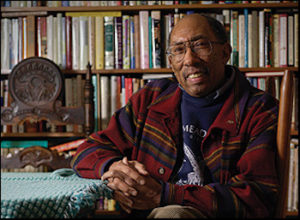
Julius Lester
*Julius Lester was born on this date in 1939. He was a Black Jewish educator, musician, and writer.
Born in St. Louis, Missouri, he is the son of a Methodist minister. As a teenager, Lester lived in Nashville, Tennessee, spending most summers at his grandmother's farm in Arkansas. Growing up, he wanted to be a musician. In 1960, Lester graduated from Fisk University with a degree in English. Moving to New York City, he recorded two albums, performed with Pete Seeger, Phil Ochs, and Judy Collins, and worked as a radio announcer. His first book was The 12-String Guitar as Played by Leadbelly: an Instructional Manual dealt with Black folk music.
He also was active in the Civil Rights movement, joining the Student Non-Violent Coordinating Committee (SNCC) as head of their photo department. Since then, his photographs from that time have been included in an exhibition at the Smithsonian Institution and are part of the permanent collection at Howard University. Some of his photographs have been in group shows at Pivot Media, Florence, Mass., and Valley Photographers, Springfield, Mass. In 1969, Lester published two works as a children's author. They were To Be a Slave and Black Folktales. His subsequent writings continued to show his interest in African American history, folklore, and politics.
Over the years, he published 35 books; 7 non-fiction, one book of poetry, two novels, and 25 children's books. Among the awards these books have received are the Newberry Honor Medal, the Lewis Carroll Shelf Award, National Book Award Finalist, National Jewish Book Award Finalist, National Book Critics Circle Award Finalist, and Boston Globe/Horn Book Award. Numerous titles have also appeared on the New York Times Outstanding Book list and American Library Association Notable Book list. Lester also has published over 200 hundred essays and reviews in such publications as the New York Times Book Review, New York Times Op-Ed Page, Boston Globe, Village Voice, The New Republic, Forward, and the Los Angeles Times Book Review.
Lester joined the faculty of the University of Massachusetts in 1971 as a professor in the Judaic and Near Eastern Studies Department and adjunct professor of History. In 1974, while on retreat at the Trappist monastery in Spencer, Massachusetts, one of the monks told him, "When you know the name by which God knows you, you will know who you are." Lester searched with the passion of one seeking the Eternal Beloved. He found that his name was Yaakov Daniel Ben Avraham v' Sarah. And he was a Jew; he converted to Judaism during that time.
Lester has been honored with all three of the university's most prestigious faculty awards: The Distinguished Teacher's Award, the Faculty Fellowship Award for Distinguished Research and Scholarship, and the Chancellor's Medal, the university's highest honor. The Council for Advancement and Support of Education selected him as the Massachusetts State Professor of the Year in 1988. Also, for ten years, he was the lay religious leader of Beth El Synagogue in St. Johnsbury, Vermont.
Julius Lester died on January 19, 2018. He had five children and lived with his wife and one cat on a secluded twelve acres in a small town in western Massachusetts.
University Of Massachusetts
140 Hicks Way
Amherst MA 01003-9272